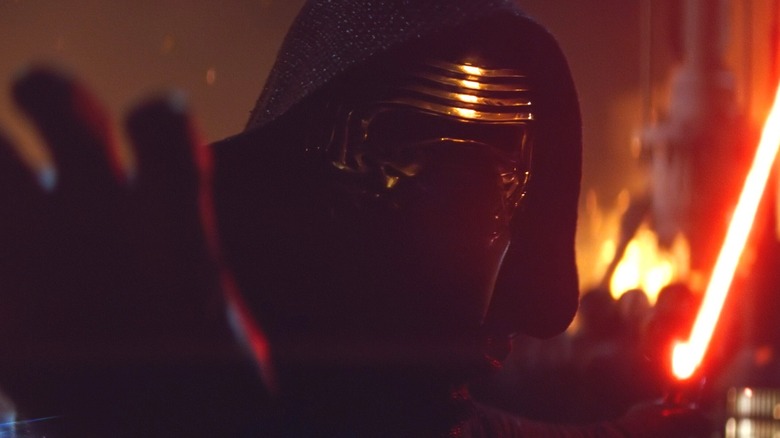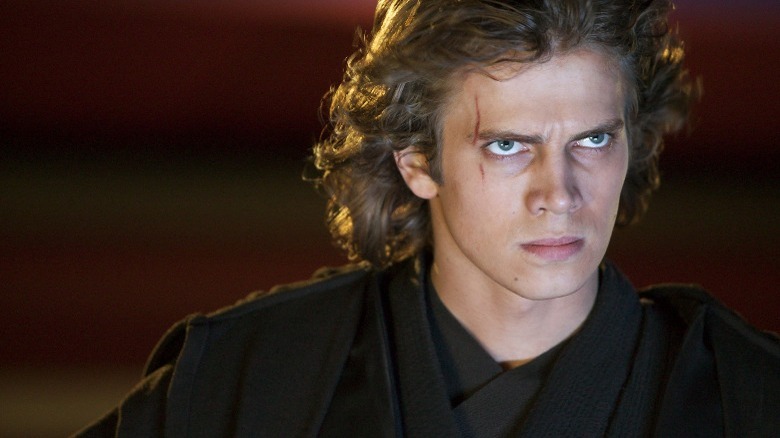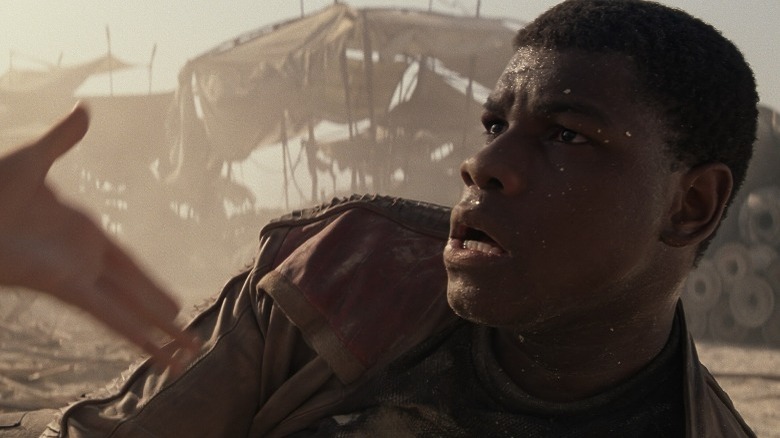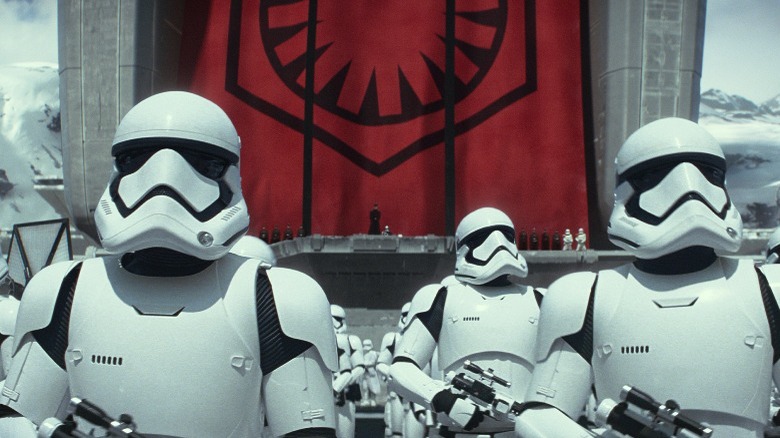Star Wars: The Force Awakens Director J.J. Abrams Set One Requirement For The Film
When The Walt Disney Company purchased Lucasfilm in 2012, it immediately made plans to cash in on the $4 billion deal with a brand new "Star Wars" film. One of the biggest, most successful franchises in film (and merchandising) history, the series promised to be an especially profitable feather in the Disney cap. "Episode VII" would be a sequel to 1983's "Return of the Jedi," with its 30-year-plus time difference adding a significant dose of nostalgia.
Lucasfilm and Disney knew they had something with immense potential on their hands, but finding a director would be difficult. They needed somebody with a handle on the blockbuster formula, somebody who could mine the nostalgic potential for all it was worth, and somebody who could launch something new to appeal to viewers young and old. They got J.J. Abrams, a man with ample experience doing all three.
The pressure was immense, even for a director who had helmed two massive "Star Trek" reboot movies just years beforehand. He had directed "Mission: Impossible III" as well, and his major non-franchise film, "Super 8," showed a firm and thoughtful understanding of blockbuster godfather Steven Spielberg's blending of pyrotechnics and sentimentality. But "Star Wars" was a different entity altogether.
From 1977 to 2005, there had been only six "Star Wars" films. Each one was a cultural moment in its own right, with at least three years passing between every movie and sixteen years passing between the classic "Original Trilogy" and the newer "Prequel Trilogy." The first movie in the series' Disney era would set the tone for how a generation perceived it, so Abrams had to rely on one essential credo: focusing on the most delightful and electric elements of the movie, and turning it up to 11.
Rebuilding the franchise
Franchise creator George Lucas knew that the "Star Wars" prequels wouldn't meet fans' expectations. But he soldiered on anyway, making them the way he wanted and in accordance with his own unique, sometimes alienating, visions. The prequels lacked some of the original trilogy's big thrills and twists, and their convoluted plot mechanics were probably a little too political and intricate for kids' movies. All that, plus the tragic arc and any of the grievances older series fans brought to the movies (whether it was performance quibbles, the early digital photography, or wonky greenscreen) meant the trilogy ended up getting a largely mixed reception at the time.
With Lucas ceding control of the franchise to Disney, the company was given a blank slate on which to redeem the series. Whatever "Episode VII" would be, it would be a reaction to those complaints and that divisiveness. Reports from that period suggest that directors like David Fincher, Brad Bird, Jon Favreau, and Matthew Vaughan were up for the gig at one point or another, but Abrams ended up with it.
If the typical complaints of the prequel trilogy, then the most recent films in the series, largely came down to the movies being boring, overly complicated, and talky, dry, and flatly directed, Abrams was one director who would go in the opposite direction. With his prime directive with co-writer Lawrence Kasdan being on "delighting" the audience, he would handle the project with energy and elegance. And there wouldn't be a single scene set in the Galactic Senate Hall.
The J.J. Abrams school of delight
Where the "Star Wars" prequel trilogy, all written (or co-written) and directed by George Lucas, had numerous scenes of high-ranking, influential characters in the Galactic Senate or the Jedi Council debating plot matters, J.J. Abrams' film would dispense with all of that. Its thrills would be in line with the original trilogy, with unbelievable sights and a sense of narrative momentum that never lets up for a second. Even its title, "The Force Awakens," suggests a return to that old-school feeling, that sense of delight that was Abrams' guiding light.
Abrams told Wired at the time of the movie's release that any time the monumental task of building a "Star Wars" trilogy felt tough, he and co-writer Lawrence Kasdan asked themselves the same question: "How do we make this movie delightful?" Removing any other questions — of merchandising, of toys, of worldbuilding, or anything else — and focusing exclusively on making a movie that would make viewers feel good, became a mission.
The ten years since Lucas's 2005 operatic tragedy "Revenge of the Sith" had cleared the air for a movie that was as gleaming and hopeful-feeling as "The Force Awakens." Rather than the morally conflicted fall from grace of the prequel trilogy's Anakin (Hayden Christensen), "The Force Awakens" focuses on scrap-heap loner Rey (Daisy Ridley) and former stormtrooper Finn (John Boyega) as they join forces to help the Resistance find lost original trilogy hero Luke Skywalker (Mark Hamill). The two are incredibly charming together, and when they team up with the older, but still roguish Han Solo (Harrison Ford), that feeling only grows.
It paid dividends, with some even thinking its 2017 follow-up, "The Last Jedi," lacked the charm and was a worse film for it.
The cost of nostalgia-mining
When focusing on delight, J.J. Abrams made a crucial choice that ultimately informed what became the "sequel trilogy" of "Star Wars" entries. By pushing every possible button on the happiness machine, he made a movie that remixed so many iconic details of the original trilogy, borrowing particularly heavily from 1977's "A New Hope." The extremely vague worldbuilding of the movie hearkens back to that first George Lucas movie, which was fine when it was all viewers had. But six movies in, some more context or clarity could have helped, especially given how messy and anticlimactic the trilogy ended up being.
Still, even if "The Force Awakens" is practically a remake of "A New Hope," and even if it doesn't properly lay the groundwork for a full trilogy, the movie by itself represents Abrams at his best as a director. His already brilliant eye for casting was never better than it was when assembling the ragtag rebels of the movie, and his sense of action and blocking was stronger than ever. Maybe there was laziness in picking certain delightful beats of the movie, but it hardly matters when the end result is as strong as "The Force Awakens" was.



